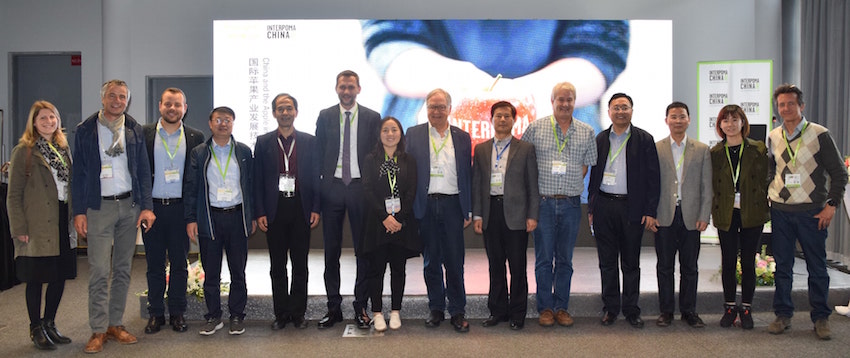Interpoma China Congress: a content-packed three days
The third edition of the international congress “China and the Apple in the World” was held from 15 to 17 April in Shanghai: a successful format exported from Fiera Bolzano to China, giving a complete overview of the apple sector, from pre- and post-harvest through to marketing and consumption trends.
The third edition of Interpoma China, held in Shanghai from 15 to 17 April, saw Interpoma crowned as a reference point for the apple sector, in particular due to the importance of the international congress “China and the Apple in the World”. Coordinated by apple-growing expert Kurt Werth, the recently ended edition was the venue for 12 presentations to an audience of over 250 delegates by speakers from China, New Zealand, Switzerland and Italy.
As Liu Mau Wah, president of the Joy Wing Wah Group, one of the largest Chinese fruit distributors, explains: “Apple producers are currently the largest community in China, with 70% producing the Fuji variety. Fuji have been grown in China for many years, but the market now needs new varieties, which represents a major opportunity for the apple sector. The Congress organized by Interpoma in China is very important, as its content makes it of great assistance to producers who can learn about the numerous technologies coming from the rest of the world”.
China is the world’s largest apple producer, with 41,390,000 tonnes of apples grown in 2017 on an area of 2.22 million hectares – but this is not all. Cheng Cungang of the Research Institute of Pomology, Chinese Academy of Agricultural Sciences National Apple Breeding Center, states: “According to the National Bureau of Statistics, between 2006 and 2017 the apparent consumption of apples in China increased from 25.12 million tonnes to 43.5 million tonnes, an increase of 70% in 11 years. With annual per capita consumption of 31.4 kg, total consumption in China represents over half the world market, with China now also the world’s leading consumer of apples”. His speech during the first day of the Congress aroused huge interest, giving a snapshot of the state of the apple sector in China while investigating the aspects to be improved in order to achieve specific development goals. “It is essential to promote a genuine transformation of the Chinese apple sector by means of a transition from traditional production methods to modern farming techniques. The aim is to make apple growing a rich and promising sector in which it is pleasant to live and work”, continues Cheng Cungang. “That means we need to reduce the use of resources such as water, soil, fertilizers, pesticides and labor; increase the use of technology and mechanization; respect the environment in a context of eco-sustainability; and increase productivity and therefore profitability. To accomplish this it is essential to raise awareness among businesses of the need to invest and believe in this future development”, he concluded.
Roger Harker, Professor at the University of Auckland, New Zealand, made a presentation on the color, size, taste, texture and price characteristics that are most appreciated by apple consumers. He says:
“Food quality is paramount. Fruit growers can control quality through the selection of cultivars, orchard management and fruit ripening at the time of harvest. The value of apples for the consumer is defined by the relationship between quality and price”.
The congress program also included speeches by Kurt Werth, with an overview of apple production in Russia and Asia and a report on how the introduction of chemical thinning can reduce manual work. Matteo Bartolini of the Italian Confederation of Farmers (CIA) addressed the issue of organic farming, presenting data and development trends in European Union countries, with Claudio Sedivy of Wildbiene and Partner, Switzerland, focusing attention on the importance of bees and the pollination process for apples. The new requirements for the protection of apple trees in China were at the center of the presentation by Zhou Zongshan of the Plant Protection Center, Research Institute of Pomology, Chinese Academy of Agricultural Sciences; while Cherry Li, agronomist in the Chinese company Netafim, presented the applications of fertigation technology in apple orchards.
The theme of varietal innovation was the focus of the final day, with presentations by Walter Guerra of the Laimburg Research Center in South Tyrol, Italy and by Cong Peihua, Director of the Apple Breeding Department of the National Apple Industry Technology System, China. Alberto Dorigoni from the Edmund Mach Foundation in Italy and consultant Stefan Nicolodi respectively spoke about modern farming systems for apple trees and the latest techniques in the nursery sector.
The next encounter with the world of apples will be in Bolzano, South Tyrol, Italy, with the twelfth edition of Interpoma, scheduled to run from 19 to 21 November 2020.



